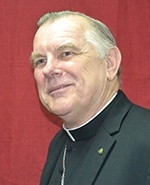By Archbishop Thomas Wenski - The Archdiocese of Miami
More than 500 years ago, the history of mankind changed forever. With the arrival of Columbus to these shores, the world grew and at the same time shrank. More land, more people, more cultures became known, and at the same time, thanks to advances in science and modes of transportation and communication, these lands, these people, these cultures encountered one another, and out of these encounters was born something new: that something we call Hispanic culture.During Hispanic Heritage Month, we celebrate this meeting of two worlds. When a woman gives birth, there is pain but also joy. Contrary to those who say that there is nothing to celebrate about Europeans "discovering" these lands, we do find reason to celebrate. We celebrate this event with joy and hope. We celebrate it with all its lights and shadows. Because, thanks to the faith that is also a happy legacy of this encounter, we can say with St. Paul: I can do all things through him who strengthens me.

The history of the Americas is a history of conquests, of wars and of misery. It is a history of racism and imperialism. In the stories written about this new continent there are many examples of selfishness, greed, and all the other deadly sins which are the inheritance of the original sin of our first ancestors, Adam and Eve. The history is all this but it is more than this.
We have to go beyond the negative current that exists in some sectors more interested in exploiting disagreements than noting the everyday achievements of our people. The history of our people is also a sacred history, a story of faith, hope and charity. If we want to understand what Hispanic culture is, we need to not only look at the faults but also to exalt the solidarity; we need to highlight the great blessings.
Blessed John Paul II said on several occasions that man cannot be understood without Christ for Christ is true man and true God who reveals to us who God is and who is man. In the same way, we cannot understand Hispanic culture without taking into account the Gospel. In Latin America, the faith has become culture. And it is a Catholic culture. To say this is not to recognize that this culture has to become more and more purified; nor does it mean that a culture with a Catholic twist is sufficient. It is also necessary that everyone have a personal faith, a faith that is convinced and coherent; a faith that is manifested through Christian charity, that is, through a love that is a result of a sincere conversion.
And here and now, in the United States, the meeting of cultures that began with the arrival of Columbus more than 500 years ago continues with the meeting between the Hispanic world and the Anglo-Saxon world.
Hispanics are the largest minority in the United States. Hispanics are now the largest group of Catholics baptized if not practicing in this country. Taken as a whole, Hispanics represent a great opportunity and a great hope for the society of the United States and the Catholic Church in America. Their values are shaped by their Catholic religious culture. And so, I think that Hispanic immigrants can renew American society because they represent an antidote to the individualism and moral relativism that has infected popular culture in this country.
Immigrants, and Hispanics in particular, who seek economic opportunity in this nation still believe in the American dream. They believe that through hard work and by taking advantage of the opportunities this country offers, one can improve ones lot in life. This is reflected at all economic levels, from the professional to the humble migrant worker. It is particularly reflected in those whose contributions and potential usefulness to American society are doubted by many; specifically poor immigrants who take the jobs that Americans do not want.
In the daily life of Hispanics here in the United States, we see a living testimony to those words of St. Paul: I can do all things through him who strengthens me.


Comments from readers
Thank you for reminding us of Jesus' words, "That they all may be one," and of our national moto, "E pluribus unum."
Paz y Bien, Rolando.